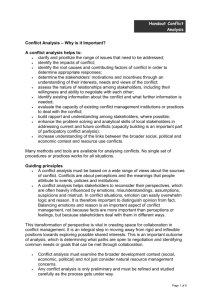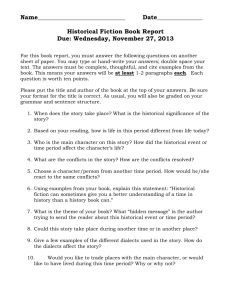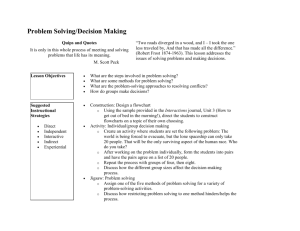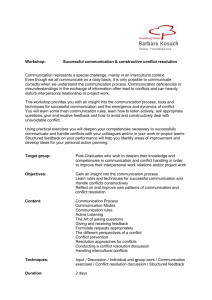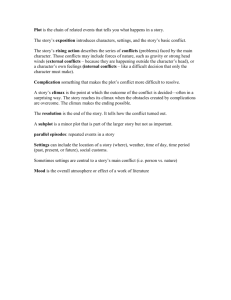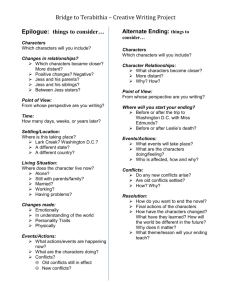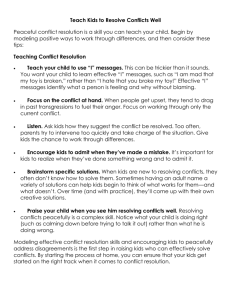conflict resolution
advertisement
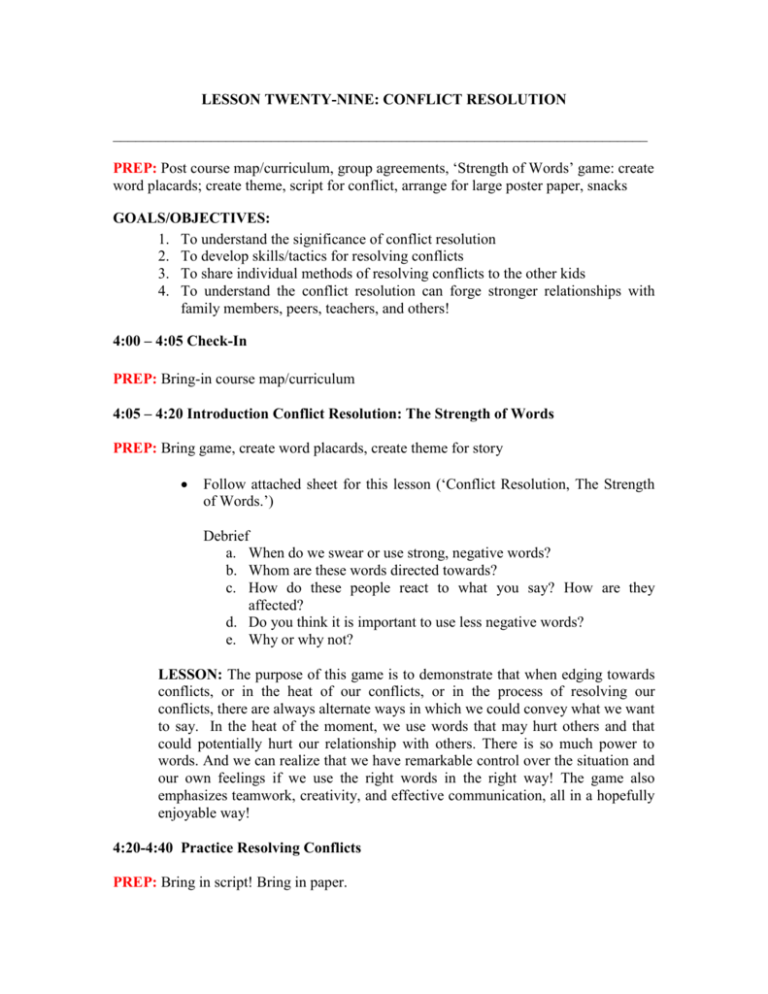
LESSON TWENTY-NINE: CONFLICT RESOLUTION _______________________________________________________________________ PREP: Post course map/curriculum, group agreements, ‘Strength of Words’ game: create word placards; create theme, script for conflict, arrange for large poster paper, snacks GOALS/OBJECTIVES: 1. To understand the significance of conflict resolution 2. To develop skills/tactics for resolving conflicts 3. To share individual methods of resolving conflicts to the other kids 4. To understand the conflict resolution can forge stronger relationships with family members, peers, teachers, and others! 4:00 – 4:05 Check-In PREP: Bring-in course map/curriculum 4:05 – 4:20 Introduction Conflict Resolution: The Strength of Words PREP: Bring game, create word placards, create theme for story Follow attached sheet for this lesson (‘Conflict Resolution, The Strength of Words.’) Debrief a. When do we swear or use strong, negative words? b. Whom are these words directed towards? c. How do these people react to what you say? How are they affected? d. Do you think it is important to use less negative words? e. Why or why not? LESSON: The purpose of this game is to demonstrate that when edging towards conflicts, or in the heat of our conflicts, or in the process of resolving our conflicts, there are always alternate ways in which we could convey what we want to say. In the heat of the moment, we use words that may hurt others and that could potentially hurt our relationship with others. There is so much power to words. And we can realize that we have remarkable control over the situation and our own feelings if we use the right words in the right way! The game also emphasizes teamwork, creativity, and effective communication, all in a hopefully enjoyable way! 4:20-4:40 Practice Resolving Conflicts PREP: Bring in script! Bring in paper. Have two student volunteers act out the attached fight (‘Conflict Resolution, Script for Conflict.’) Debrief a. b. c. d. e. f. What is going on here? What could have been different? Could both of the students acted differently? Could there have been a win-win resolution? If so, how? What makes conflicts escalate in general? What words can people say to indicate that they want to stop the fight and try to solve the problem? Now, break the students up into separate groups Have each group develop their own conflict resolution script and their own method of resolving the conflict. Try to encourage the kids to base their script on conflicts they have encountered in their own lives! Have each group present their scripts! Personal Reflection/Debrief a. Have you ever had a conflict like this one? How did you resolve it? b. Have you ever been in a situation where it was much easier to resolve a conflict? c. What made it easy? d. What can make resolving conflicts difficult/challenging for you? e. Why do you think conflict resolution is important to consider? Why not just fight it out? LESSON: Resolving conflicts can bring one several steps closer to establishing more peaceful relationships with others. It can establish new avenues towards developing trust and openness between individuals! Any person who is able to better resolve conflicts could find, sometimes to his/her own surprise, that he/she is more capable of controlling and molding any situation to produce a desirable outcome—one that could even appease all involved members in a conflict! 4:40 – 4:45 Group Agreements 4:45 – 4:55 Wrap Up PREP: Snacks Assign new roles Fist to Five + Snacks Agenda for next week LESSON TWENTY-NINE: CONFLICT RESOLUTION SCRIPT FOR CONFLICT Two students are required to work together on a partner project. Student 1 has completed what he/she is required to. Student 2 fails to do his/her side of the project. Scene: A classroom Student 1: Hey, man. You were supposed to finish this part of the project by today. Student 2: Yea, I know. But I totally forgot. Got caught up with watching like 8 back-toback episodes of Fresh Prince of Bel-Air last night. Sorry! Student 1: Ok. But I spent like 10 hours last night completing what I was supposed to do! Student 2: Ha. You are such a nerd. Why don’t you take it easy once in a while. Relax. Its due tomorrow. Student 1: Yea. But we need time to review our info. together and everything, and we were supposed to do that today. I don’t get it! This is frustrating. I wanna good grade on this project. Student 2: You are such a loser. Take a break. Student 1: Don't be a jerk! Can’t you see that this just isn’t fair! You obviously don’t care if you fail this course. Student 2: Eh. Whatever. All you are good at is sticking your nose into a book and making sure that you have read cover-to-cover, and then sucking up big time to all the teachers in the school. No wonder no one is interested in being your friend. Student 1: You are such a creep. Wait till I tell the teacher that you didn’t contribute anything to the project. Student 2: Oh, back in second grade, are we? Tattle-taling. Student 1: Ugghh! I loathe you! Student 2: Who says loathe these days? LESSON TWENTY-NINE: CONFLICT RESOLUTION THE STRENGTH OF WORDS A story will be created between two separate groups of kids. More groups can be created depending upon the number of kids in the class. However, the story will be created with each group separately providing a new, additional sentence to the story using a word provided by the mentor/kid. The mentor/kid will stand at the center, holding each word on a different placard. However, here is the catch. The kids can’t exactly use the word on the card. They must come up with another word that is of less magnitude than the word on the card will convey. For example, if the word on the card was ‘Hate.’ Instead of saying, ‘I hate doing homework!’, the kids could come up with ‘I don’t like doing my homework very much!’ A theme for the story should be provided in the beginning. For example, a possible theme for the story could be ‘The Ruthless Muppet’. Examples of words that can be placed on the placards include ‘Hell’, ‘Ugly’, ‘Hate’, ‘Idiot’, ‘Fool’, ‘Hitler’, ‘Jerk’, or any other word that portrays extreme negativity. The purpose of this game is to demonstrate that when edging towards conflicts, or in the heat of our conflicts, or in the process of resolving our conflicts, there are always alternate ways in which we could convey what we want to say. In the heat of the moment, we use words that may hurt others and that could potentially hurt our relationship with others. There is so much power to words. And we can realize that we have remarkable control over the situation and our own feelings if we use the right words in the right way! The game also emphasizes teamwork, creativity, and effective communication, all in a hopefully enjoyable way! Mentor Group I Group II
